#thebes
Explore tagged Tumblr posts
Text
A Boar and A Lion ( Tydeus and Polynices )
I was honestly not surprised when I found out Diomedes’s dad has his own yaoi (I mean that level of homosexuality needs to come from somewhere) BUT I WAS SURPRISED MTF ATE A GODDAMN BRAIN-
I still don’t know the full Thebaid yet but from bits and pieces I managed to find, this is my attempt of them! Their first meet is them almost beat each other to death, questionable way to start your situation-ship but who am I to judge-
If you guys have any recommend sources for learning more about Thebaid please tell me!



#tydeus#polynices#Tydepoly#is that the ship name??? idk#thebaid#the thebaid#seven against thebes#greek mythology#diomedes#thebes#polytyde
522 notes
·
View notes
Text
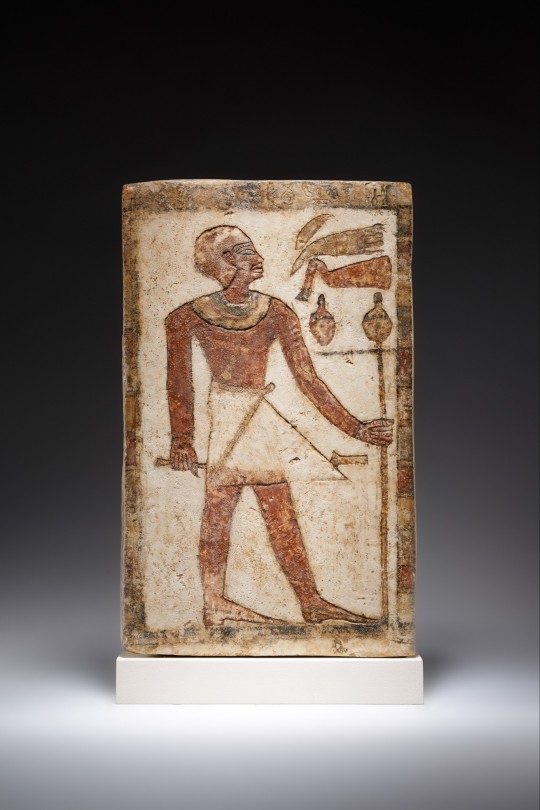
~ Stela of a Man.
Period: Middle Kingdom, 11th Dynasty
Date: ca. 2030–1981 B.C.
Place oforigin: Egypt, Upper Egypt, Thebes, Deir el-Bahri, Cemetery 100, Tomb TT 114, MMA excavations, 1926–27
Medium: Limestone, paint
#ancient#ancient art#history#museum#archeology#ancient egypt#ancient sculpture#ancient history#archaeology#egyptian#egyptology#Egypt#stela of a man#11th Dynasty#middle kingdom#thebes#ca. 2030 b.c.#ca. 1981 b.c.
639 notes
·
View notes
Text

statuette of a young woman | c. 1500 - 1450 BCE | thebes, egypt, 18th dynasty
"This fragmented image represents an elite woman wearing a pleated linen dress. She holds a lotus flower in her hands, a symbol of rebirth, and on her head is an incense cone. Feminine representations like this are characteristic of the sophistication and luxury of this period."
in the museu nacional collection
118 notes
·
View notes
Text






Statue of Ramesses II
* Thebes, temple of Amun
* 1279-1213 BCE
* Stone / Granodiorite
* Egyptian Museum, Turin
* Info on statue (Museo Egizio page)
Turin, June 2023
#Ramesses II#pharaoh#Egypt#13th century BCE#ancient#art#statue#king#figurine#Thebes#temple#clothing#Turin Egyptian museum#my photo
57 notes
·
View notes
Text
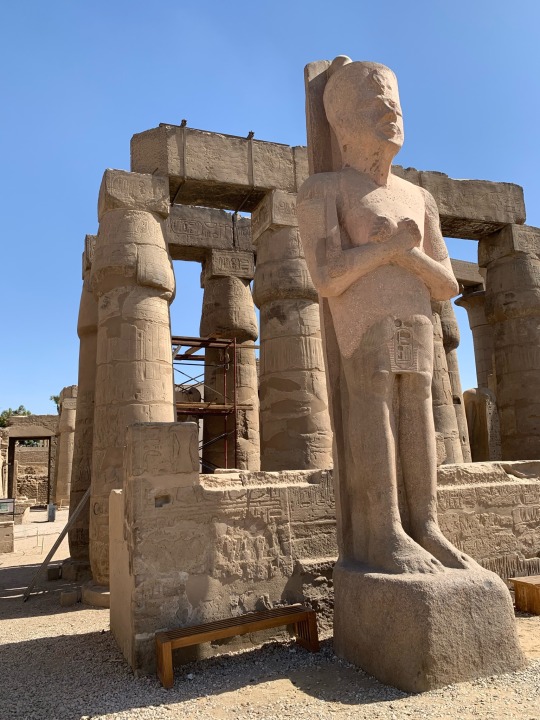
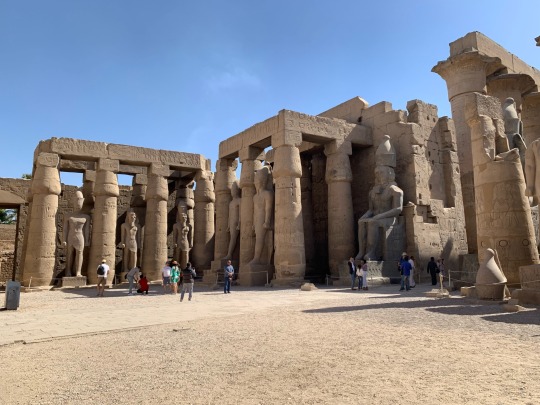
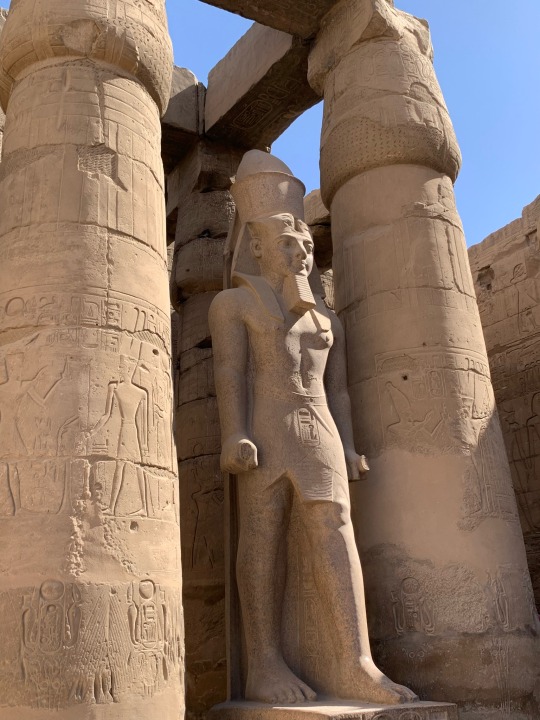
Luxor Temple, March 2023
#Luxor#temple#Thebes#waste#Egyptian temple#Egyptian#Egypt#ancient Egyptian#ancient Egypt#Kemet#Kemetic#Kemeticism#ramesses ii#pharaoh#Egyptian pharaoh
494 notes
·
View notes
Text

Frederic Leighton (English, 1830-1896)
Antigone
146 notes
·
View notes
Text
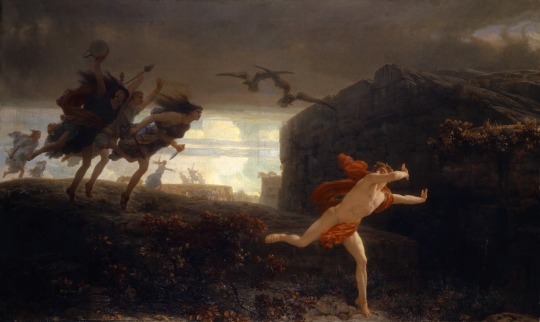
Pentheus Pursued by the Maenads by Charles Gleyre
#pentheus#maenads#greek mythology#art#charles gleyre#tragedy#ancient greek#ancient greece#dionysus#euripides#the bacchae#thebes#king#mythology#mythological#europe#european#history
320 notes
·
View notes
Text
Was doing some research on Diomedes and found out Tydeus was a pupil of Athena, a favorite of hers to the point she offered him immortality. He was a man blessed by the gods and yet, his actions disgusted the gods himself. In battle, Tydeus ate the brains of his enemy. An act so barbaric and out of line that it lost him the blessing of Athena.
Why did that happen? How come Tydeus decided to take that barbaric action? The act most certainly did not represent Tydeus’ character (if it had why would Athena be surprised and shocked?). Could one blame the gods? Striking Tydeus with madness? Or was it simply a fatal flaw in the king? A rage so unnatural and overbearing that it took control of him completely — a flaw overlooked by the gray-eyed goddess. A mistake that she would not commit again.
Diomedes himself is typically characterized as short-tempered and prone to anger, although he has far more self control and respect than any of the other greek kings (except for Nestor I suppose). He was mentored and sculpted into the man he was in the Trojan war by Athena herself, aiding him at all times, blessing him more than she did even Odysseus. She felt she owed the family of Tydeus, most likely treating them much like she treated Odysseus’ family in the Odyssey.
She most certainly succeded in preparing Diomedes to be such a great warrior, Aeneas comments that he was second only to Achilles in the greek army (although typically it is Telamonian Ajax who is said to be the second strongest greek) and Diomedes is most certainly one of the highest-trusted greeks in the army (It is he who is entrusted with the espionage to Troy, and it is he who is tasked with choosing who will follow HIM). Diomedes also has armor made by Hephaestus himself! An honor only appointed to Achilles. He was beloved by the gods, most definitely, and talented in all parts of war — talent which certainly came from his experience taking Thebes to avenge his father.
Diomedes shows incredible restraint, care, and control in his time in the war. He perhaps represents exactly what a greek warrior should be. Not burdened by the suicidal rage of Achilles. Not hindered by the constant lies of Odysseus. Not tainted by the pride of Agamemnon. Perhaps that is why he went on to be worshipped as a divine being in parts of Greece.
#doob#iliad#the iliad#trojan war#diomedes#thebes#argos#odysseus#achilles#agamemnon#telamonian ajax#greater ajax#troy#tydeus#7 against thebes#greek mythology#mythology#tagamemnon
281 notes
·
View notes
Text





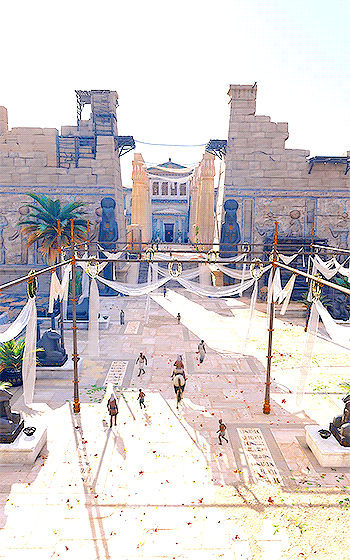
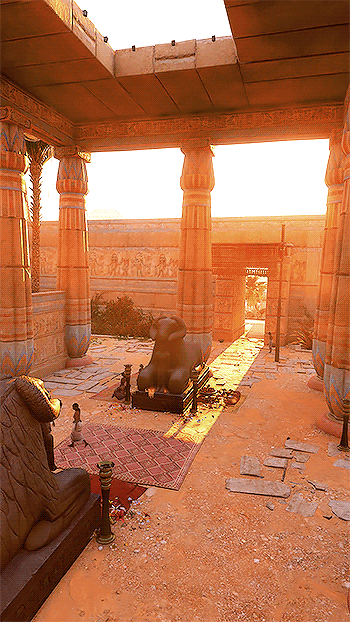

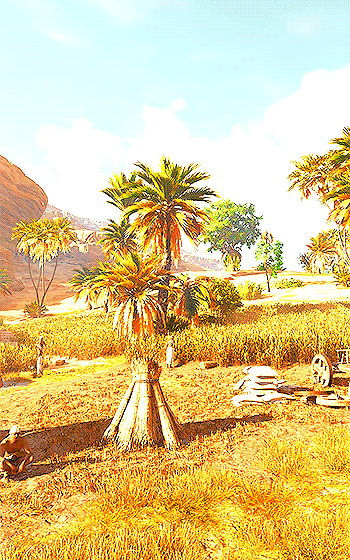

Assassin's Creed Origins | Thebes (1/?)
#acoriginsedit#mygifs#gamingedit#acedit#assassin's creed#assassin's creed origins#thebes#acscenery#gamingdaily#dailyvideogames#dailygaming#gamingnetwork#gameplaydaily#vgedit
359 notes
·
View notes
Text
Guys, I'm concerned right now...


So I just found out that "Amyclas" was the name of two different men in Greek mythology, but it's also implied here that they could be the same person??? Ex-fucking-cuse me?!!
Do you know what this means?
Amyclas of Sparta is the father of Hyacinthus, who is Apollo's lover. Making Amyclas a son of Niobe would mean Apollo (and Artemis) had murdered Hyacinthus' aunts and uncles and was damn close to ceasing Hyacinthus from existence if he didn't spare his father.
Apollo is wild. He didn't just went after his enemy's children, but her grandchildren as well.
But this could be another case of mythology conflation, just like how Hyacinthus the Spartan prince was conflated with Hyacinthus the father of the Hyacinthides. There has got to be something tricky going on.
The Wikipedia page cited Apollodorus as the source for the Theban Amyclas, so I went to check it out. Here's what The Bibliotheca Book 3 said:

That was all I can find about the Theban Amyclas, and there was no mention of him fleeing to Sparta and becoming the Spartan Amyclas. I even use Control Find for the name to make sure I didn't miss out on anything.
Not only that, but The Bibliotheca talks about the Spartan Amyclas as if he was a completely different man from his Theban counterpart.

Maybe there are accounts that confirm Theban Amyclas and Spartan Amyclas' connection? I mean we do know Hyacinthus has a Spartan, Athenian, and Thessalian counterpart, so I wouldn't be surprise if the same thing is true for Amyclas. I just need sources to confirm this.
If anyone has any addition to this, please let me know! I would love to hear you out!
#amyclas#hyacinthus#niobe#apollo#sparta#thebes#greek mythology#apollodorus#bibliotheca#Hyacinthus is already a complicated figure and his family also didn't escape the messiness of names and lineages#his sister Laodamia is also called Leaneira (or was she another person?)#his nephew Oebalus is either the son of Argalus or Cynortas depending on who you asked#and his brother Cynortas might have had a different son name Perieres (or maybe that guy was from a different family)#and his other brother Argalus was mentioned in a 1600s play (or was that Argalus a different one as well?)#ah it's like the Lacedaemonids have a family tradition to be difficult to study
33 notes
·
View notes
Text
The Strange Things with the Thebans...
I promised you guys that I'll make an essay about it so let's get it started.
Chapter I: Cadmus & The Dragon
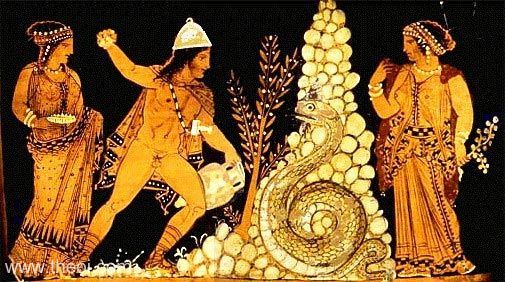
One of the greatest heroes before Heracles alongside Perseus and Bellerophon, Cadmus is the mythological founder king of Thebes. One interesting fact about him is that, despite of being considered a greek hero, Cadmus wasn't even greek in the first place. In fact he was phoencian and came from a city called Tyre. By ancient standards he would've been considered a "barbarian". Another irony is that Cadmus' initial purpose wasn't even to become a king, but to rescue his sister Europa, at that time kidnapped by Zeus in the shape of a bull. A further irony: Europe was named after an asian princess. Aaand another further irony: when the modern state of Hellas/Greece joined the European single currency, and so abandoned the drachma of old, it celebrated its accession and new monetary union by striking a coin bearing the image of Zeus disguised as a bull in the act of abducting (a polite way of masking the actual fact of rape) Europa.
Anyway, back to Cadmus: Once arrived in Boetia he intended to sacrifice a cow to Athena and asked his men to fetch water from the river. There was one single, little, tiny, itsy-bitsy problem though: the said river was guarded by the Ismenian Dragon, who also happened to be Ares' son. So Cadmus, just like any other hero, slayed the dragon and, listening to Athena's advice, planted the serpent's teeth. Out of these teeth a bunch of dudes grew up and started to fight (and consequently kill) each other, with the exception of five who survived: Echion, Udaeus, Chthonius, Hyperenor, and Pelor, who are now considered the ancestors of thebans. (Okay, the question now would be with whom they reproduced, but that's an ask even I don't want to know the answer to...).
Pseudo-Apollodorus, Bibliotheca 3. 22 (trans. Aldrich) (Greek mythographer C2nd A.D.) : "[Kadmos (Cadmus)] sent some of his men to fetch water from the spring of Ares, but a Serpent, said by many to be a child of Ares, guarded the spring and destroyed most of those who had been sent. In outrage Kadmos killed the Serpent, and then, following the instructions of Athena, planted its teeth. From this sowing there sprang from the earth armed men, called Spartoi (Sparti). These proceeded to kill each other, some in voluntary encounters, and others in ignorance. Pherelydes says that when Kadmos saw the armed men growing up from the earth, he threw stones at them, and they, believing that they were being hit by each other, started their fight... As for Kadmos, to atone for the deaths he served Ares as a laborer for an 'everlasting' year, for a year then was equal to eight years now."
Cadmus was punished for slaying the dragon by serving Ares for a certain period of time. Later, Athena assigned to him the government of Thebes and Zeus gave him Harmonia as his wife. Found another irony: Harmonia was the daughter of Ares, which makes him and Cadmus in-laws. Irony number five million: despite of being married with the personification of harmony herself, Cadmus' family tree is characterized by an entire disharmony. According to Statius, Harmonia received from Hephaestus a cursed necklace that brought unluck, which later got passed from one generation to another:
Statius, Thebaid 2. 265 ff (trans. Mozley) (Roman epic C1st A.D.) : "The dread necklace of Harmonia... The Lemnian [Hephaistos], so they of old believed, long time distressed at Mars' [Ares'] deceit and seeing that no punishment gave hindrance to the disclosed armour, and the avenging chains removed not the offence [of his affair with Hephaistos' then wife Aphrodite], wrought this [a cursed necklace] for Harmonia on her bridal day to be the glory of her dower [description of the necklace follows]... The work first proved its worth, when Harmonia's complaints turned to dreadful hissing, and she bore company to grovelling Cadmus, and with long trailing breast drew furrows in the Illyrian fields [the pair were turned into serpents in Illyria]. Next, scarce had shameless Semele [their daughter] put the hurtful gift about her neck, when lying Juno [Hera] crossed her threshold. Thou too, unhappy Jocasta, didst, as they say, possess the beauteous, baleful thing, and didst deck thy countenance with its praise - on what a couch, alas! to find favour; and many more beside. Last Argia shines in the splendour of the gift, and in pride of ornament and accursed gold surpassed her sister's mean attiring. The wife of the doomed prophet [Eriphyle wife of Amphiaraus] beheld it, and at every shrine and banquet in secret cherished fierce jealousy, if only it might be granted her to possess the terrible jewel, nought profited, alas!"
Cadmus and Harmonia left Thebes after a series of catastrophes which happened in their family and emmigrated to Illyria where they battled various local tribes to found a new kingdom. Eventually, they two got turned into snakes and carried off to the Elysium to live a peaceful life.
Pseudo-Apollodorus, Bibliotheca 3. 39 : "Kadmos (Cadmus) and Harmonia left Thebes and went to the Enkhelean (Enchelean) people. They were being harassed by the Illyrians, and learned from the god through an oracle that they would overpower the Illyrians if they had Kadmos and Harmonia as their leaders. Trusting this, they made these two their leaders in the campaign, and did indeed defeat the Illyrians. Kadmos ruled the Illyrians, and fathered a son named Illyrios, Later on, both he and Harmonia were turned into serpents, and were sent by Zeus out to the Elysian field."
Chapter 2: Semele Thyone
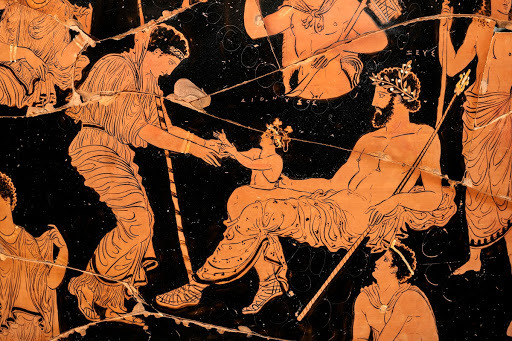
Semele: the youngest daughter of Cadmus and Harmonia and mother of Dionysus, and the theban princess infamously known for her not-so-bright intellectual capabilities.
Zeus slept with Semele and left her pregnant. Later, Hera payed her a visit disguised as her nurse and told her to ask Zeus to come to her in the same way he's coming to his wife (gotta admit, I didn't expect Hera to be this horny...). Later, Semele got killed by Zeus for her mistake, and Zeus managed to rescue the fetus she was carrying in her womb and let it develop inside his thigh.
Pseudo-Apollodorus, Bibliotheca 3. 26-27 (trans. Aldrich) (Greek mythographer C2nd A.D.) : "Zeus fell in love with Semele and slept with her, promising her anything she wanted, and keeping it all from Hera. But Semele was deceived by Hera into asking her to come to her as he came to Hera during their courtship. So Zeus, unable to refuse her, arrived in her bridal chamber in a chariot with lightning flashes and thunder, and sent a thunderbolt at her. Semele died of fright, and Zeus grabbed from the fire her sixth-month aborted baby, which he sewed into his thigh. After Semele's death the remaining daughters of Kadmos (Cadmus) circulated the story that she had slept with a mortal, thereafter accusing Zeus, and because of this had been killed by a thunderbolt."
Pseudo-Hyginus, Fabulae 179 : "Jove [Zeus] desired to lie with Semele, and when Juno [Hera] found out, she changed her form to that of the nurse Beroe, came to Semele, and suggested that she ask Jove to come to her as he came to Juno, ‘that you may know,’ she said, ‘what pleasure it is to lie with a god.’ And so Semele asked Jove [Zeus] to come to her in this way. Her request was granted, and Jove, coming with lightning and thunder, burned Semele to death. From her womb Liber [Dionysos] was born. Mercury [Hermes] snatched him from the fire and gave him to Nysus to be reared. In Greek he is called Dionysus."
Years later Dionysus rescued her from the Underworld. She was made immortal and received the name Thyone:
Pseudo-Apollodorus, Bibliotheca 3. 38 (trans. Aldrich) (Greek mythographer C2nd A.D.) : "He [Dionysos] retrieved his mother [Semele] from Haides' realm, gave her the name Thyone, and escorted her up to the sky."
Chapter 3: The Bacchae
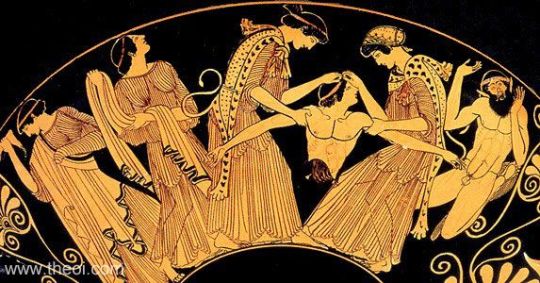
"He is life's liberating force. He is release of limbs and communion through dance. He is laughter, and music in flutes. He is repose from all cares -- he is sleep! When his blood bursts from the grape and flows across tables laid in his honor to fuse with our blood, he gently, gradually, wraps us in shadows of ivy-cool sleep."
Thebes was closely associated with a particular shape-shifting, cross-dressing, gender-bending deity: Dionysus. Despite the fact that Thebes worshipped Dionysus even ahead of Apollo, according to Euripides' Bacchae his first visit to Thebes didn't go very well. Tragedy. Madness. Homocide. Maternal felicide. Dismemberment. Decapitation. Suicide ensued. Word Abuse.
Dionysus returns to Thebes followed by the Maenads in order to clear his mother's name and punish the thebans for not worshipping him. He disguises himself as a mortal and induces madness in all the women of Thebes, who flee to Mount Kytheron to celebrate rituals in honor of the god. Dionysus' aunts, Semele's sisters Ino, Autonoe, and Agave, are also charmed into becoming members of the Dionysian cult. In the court of the Theban palace, Cadmus and his advisor, Tiresias, prepare to join the Maenads. They are stopped by the arrival of the king of the city, Pentheus, back from his travels in Thebes. Son of Agave and Echíon, Pentheus is enraged by the condition of the Thebans and orders the immediate capture of Dionysus.
The king's messengers return bringing the god. Pentheus comes out of the palace and questions the young leader of the debauchery. Dionysus presents himself as a believer of the son of Zeus, inviting the king to join the rite. In response, Pentheus orders his confinement in a stable. The chorus mourns the prisoner, but is a few moments later the palace is engulfed in flames, and collapsed by a strong earthquake.
Dionysus emerges unscathed from the wreckage and is reunited with his maenads. Pentheus receives news from a messenger, who informs him about the situation of the maenads in the forests. They nurse wolf cubs, cast spells, and are possessed of unimaginable strength, which they use in killing herds of cows and bulls, and in attacking villages. Dionysus, still in disguise, convinces the king to abandon his plan of punishing the women by brute force. He advises him to spy on them first by dressing up as a maenad and pretending to be part of the group. Pentheus is slowly hypnotized by the god's influence and approves of the plan.
A messenger arrives to report that once the party reached the mountain, Pentheus wanted to climb a tree to get a better view, and the stranger used divine power to bend the tree and place the king in its highest branches. Dionysus revealed himself, summoned his followers and sued the intruder. The maddened maenads, led by Agave, brought Pentheus down from the tree, tore off his limbs and head, and tore his body to pieces.
Agave arrives home, carrying her son's bloody head. In her state of divine bliss, she thinks she holds the head of a mountain lion. She proudly shows it to her father, Cadmus, and is confused by his horrified expression. Agave calls Pentheus to come and marvel as well. Then the madness begins to fade, and Cadmus forces her to admit that she killed her own son. At the end of the play Pentheus' corpse is reassembled, Agave and her sisters are sent into exile, and Dionysus decrees that his grandparents, Cadmus and Harmonia, will be turned into serpents.
Chapter 4: Actaeon & his Hounds
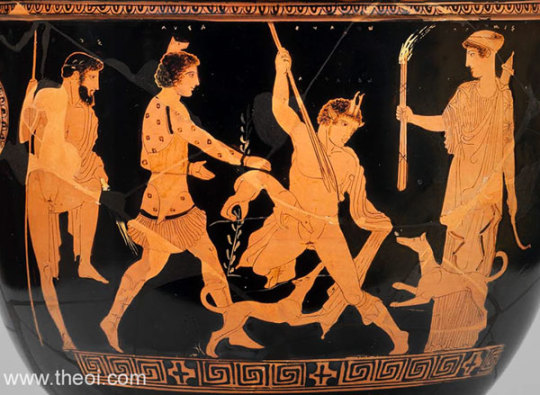
Actaeon, son of Autonoe and Aristaeus as well as a theban prince and skillful hunter, is known for a) either intentionally or accidentally seeing Artemis bathing and b) getting turned into a deer and then flayed by his hounds. Was it worth it, Actaeon? Was it?!
Pseudo-Apollodorus, Bibliotheca 3. 30 (trans. Aldrich) (Greek mythographer C2nd A.D.) :
"To Autonoe and Aristaios was born a son Aktaion, who was reared by Kheiron and trained as a huntsman, but was later eaten up on Kithairon by his own dogs [because] . . . he saw Artemis bathing. They say that the goddess changed him on the spot into a deer, and drove his fifty hunting dogs into a frenzy so that they unintentionally ate him. When he was no more, they looked for their master with great howls and bays, coming in the course of their search to Kheiron's cave. He made a likeness of Aktaion, which assuaged their grief."
Chapter 5: Leucothea & Palaemon
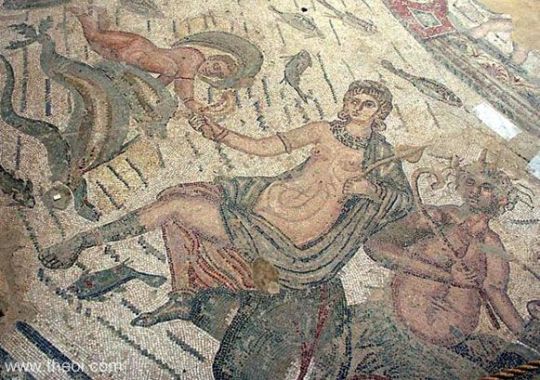
Ino married Athamas and gave birth to two sons, Learchus and Melicertes. After Hera found out they accepted to take care of infant Dionysus she inflicted both of them with madness. Athamas slew Learchus, whereas Ino grabbed Melicertes and leapt off a cliff into the sea. They were later welcomed by the sea gods and received the names Leucothea and Palaemon.
Pseudo-Apollodorus, Bibliotheca 3. 28 : "Zeus... gave birth to Dionysos, whom he entrusted to Hermes. Hermes took him to Ino and Athamas, and persuaded them to bring him up as a girl. Incensed, Hera inflicted madness on them, so that Athamas stalked and slew his elder son Learkhos (Learchus) on the conviction that he was a dear, while Ino threw Melikertes (Melicertes) into a basin of boiling water, and then, carrying both the basin and the corpse of the boy, she jumped to the bottom of the sea. Now she is called Leukothea (Leucothea), and her son is Palaimon (Palaemon): these names they receive from those who sail, for they help sailors beset by storms."
Chapter 6: The Sphinx
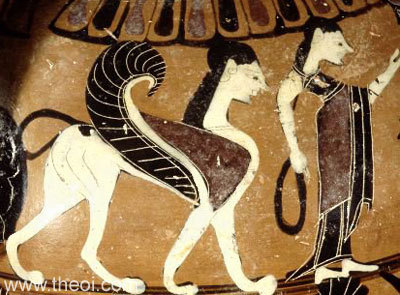
The Sphinx was a woman-headed winged lion infamously known for asking people the same riddle (and eventually turning them into dinner for giving her the wrong answer): "What is it that has one voice, and is four-footed and two-footed and three-footed?"
The origins of the Sphinx and the reason why she was sent to plague Thebes differ from one from one source to another. According to Pseudo-Apollodorus Hera sent her to Boetia as a punishment towards the Thebans for not having Lains punished, who had carried off Chrysippus from Pisa:
Pseudo-Apollodorus, Bibliotheca 3. 52 - 55 (trans. Aldrich) (Greek mythographer C2nd A.D.) : "While he [Kreon (Creon)] was king, quite a scourge held Thebes in suppression, for Hera sent upon them the Sphinx, whose parents were Ekhidna (Echidna) and Typhon. She had a woman's face, the breast, feet, and tail of a lion, and bird wings. She had learned a riddle form the Mousai (Muses), and now sat on Mount Phikion (Phicium) where she kept challenging the Thebans with it.
According to a Scholia on Hesiod's Theogony though it was Dionysus who sent her, whereas according to Euripides' Phoenicians she was either sent by Ares as a punishment for Cadmus, by Hades, or she was in fact one of Cadmus' daughters who was thrown into madness and went through a metamorphosis. Luckily it looked more like one of Ovid's Metamorphoses rather than Kafka's Metamorphosis, though after she started to eat people she certainly became a parasite. *badum tss*
Anyway, what is certain though is that she went through an existential crisis and killed herself after Oedipus managed to respond correctly to her riddle.
Chapter 7: Oedipus Rex
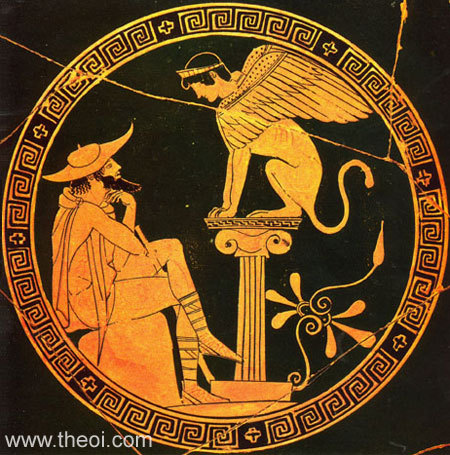
"And as for this marriage with your mother— have no fear. Many a man before you, in his dreams, has shared his mother’s bed. Take such things for shadows, nothing at all— Live, Oedipus, as if there’s no tomorrow."
Cadmus and Harmonia's only son, Polydorus, had a son named Labdacus who had a son named Laius who had a son named Oedipus; also known as the original motherfu-
The most famous myth version of Oedipus is the play Oedipus Rex or Oedipus Tyrannos, written by Sophocles.
The tragedy begins with the turmoil of the city of Thebes, which was facing a torment: the plants, animals and women were barren, and the plague made countless victims. The Thebans cane to ask Oedipus, the king of Thebes for help, who also got rid of the Sphinx by answering the Sphinx's riddle correctly. Creon, Oedipus' brother-in-law, is sent to the oracle to find out why this misfortune has befallen Thebes. The oracle reasons that the death of Laius, Oedipus' predecessor, has not been atoned for. In order to find out who killed Laius, Oedipus requests to be asked Tiresias, the old blind prophet. Tiresias tells Oedipus that he is the murderer of Laius. Believing that Tiresias and Creon have plotted against him, Oedipus argues with them. His wife, Jocasta, with whom he has four children, two boys - Eteocles and Polynices - and two girls, Antigone and Ismene, reassures him by telling him that Laios has been foretold that he will be killed by his own son, whom they gave for adoption in another country to avoid this tragedy. At that moment, Oedipus remembers the reason why he came to Thebes: to get away from his family so as not to kill his father, as he was told at birth. At a crossroad, Oedipus had a conflict with a group of robbers, thus killing his father, disguised as not to be recognized as the king. Oedipus then suffers a nervous breakdown, gouging out his own eyes since he believed that they are the ones that caused him not to see the truth.
Chapter 8: Seven Against Thebes
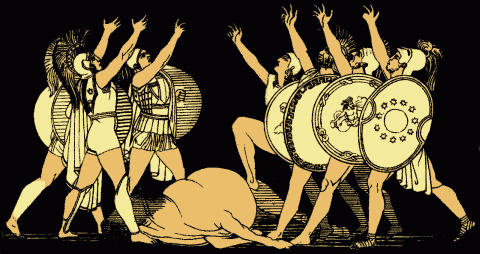
Another tragic episode from Thebes was the myth of the seven heroes who made war on this city, after the king of Argos chose them as captains of an army whose purpose was to restore Oedipus' son Polynices to the Theban throne. The myth is recounted in the play with the same name written by Aeschylus.
Seven Against Thebes opens with Eteocles calling forth every man in the city, whether child or aged, to the fight and the threat, which is at hand. Everyone must be ready to defend the city in battle. At that moment, the Scout enters with news that the enemy is just outside the walls and is preparing for battle. There are seven commanders ready to attack the seven gates of Thebes. After delivering the news, the Scout departs, and Eteocles prays to Zeus for his favor in the battle to come. The Chorus, which has entered as the Scout has related his news, begins a lament as they hear the approach of the armies. They beg their gods to protect them and their city. Eteocles hears the Chorus’ fearful pleadings as he enters and chastises them for their fear, which he says will not help their beloved Thebes. Instead, Eteocles promises that the Chorus will be stoned to death for their mindless fear, as their fear will incite the city’s residents into an instinctive fear of their own, which will disable and defeat the city. But the Chorus is not appeased, and they continue with their warnings as Eteocles warns them of the risk they create with their wailing. Eteocles again warns the Chorus to remain inside and to hold back their panic. At their continued warnings and fearful exclamations, Eteocles responds with attacks on the nature of women, their weaknesses, and their fears. Finally the Chorus promises to restrain their fear and remain silent, and Eteocles again prays to the gods, with promises of sacrifices and trophies if Thebes is successfully defended. After Eteocles leaves the stage, the Chorus continues to voice their worry at the coming battle and the risk they face if they are taken and become slaves.
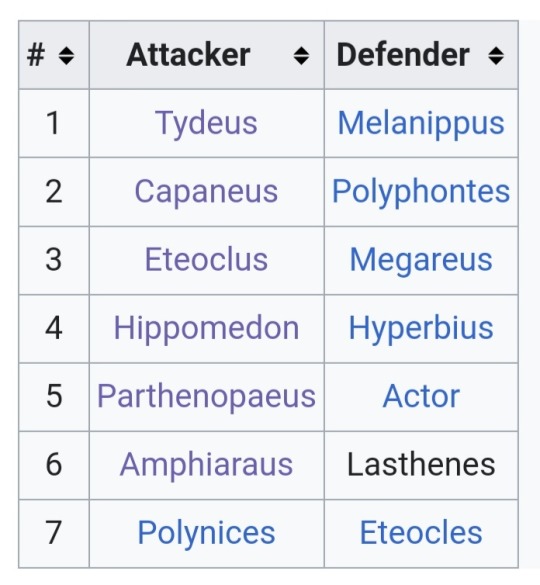
When the Scout enters, he brings news of who will lead the attack at each of the city’s gates. At the news of each opponent’s assignment, Eteocles assigns one of his men to defend that particular gate. When Eteocles is told that his brother, Polyneices, will lead the attack on the seventh gate, Eteocles decides that he will defend that gate. At this news, the Chorus warns Eteocles that he should not shed his brother’s blood, but Eteocles is beyond listening to warnings. He acknowledges the curse of his father, Oedipus, but Eteocles says that fate will determine the outcome, and if the gods are determined that he shall be destroyed, then this will happen. The chorus is dismayed at Eteocles departure and cry out that if each bother slays the other, there will be no family to see to a proper burial. The Chorus then begins to remind the audience of the story of Oedipus and the curse that followed his father, himself, and now his sons. At that moment, the Scout again enters with the news that Thebes has crushed her enemy, and the city is victorious. Six of the seven gates have withstood the onslaught of the enemy’s armies, but the battle at the seventh gate has ended in tragedy. Both Eteocles and Polyneices are dead, each at the others hand. The Scout reminds the Chorus that the city must mourn the death but also celebrate the end of the curse. The Chorus asks is they should mourn these deaths or celebrate the triumph of Thebes’ victory. With the arrival of the brother’s bodies, the Chorus acknowledges the tragedy that has unfolded. The bodies are followed closely by Ismene and Antigone, who have come to bury their brothers. The Chorus addresses the sisters, with grief and with sadness at the resolution of the curse. The two sisters respond to the Chorus with their own grief, as they lament the curse that damned both brothers. As Antigone wonders where they will bury the brothers, a Herald enters with an announcement that the council has met. The council has determined that Eteocles is a hero and will be accorded an honorable burial. However, Polyneices would have laid waste to Thebes, and thus, his corpse is to lie unburied, to be picked apart by the birds of prey. Antigone promises that she will bury her brother, as she will not be bound by the Theban council’s ruling. A brief argument with the Herald ensues, but Antigone will not be threatened, and finally, the Herald leaves to report to the council. The play ends with the Chorus divided. Half will accompany Eteocles to his grave; half will accompany Polyneices to his burial.
Aeschylus' Seven Against Thebes was part of a trilogy, along with other two tragic plays called Laius and Oedipus. Unfortunately both of them got lost, along with a comedic play titled The Sphinx. Due to the popularity of Sophocles' Antigone the ending was rewritten about half of a century after Aeschylus' death so that play could have a less mournful tone and turn Antigone into a continuation of it.
Chapter 9: Antigone
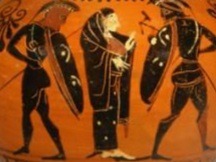
Similarly with Oedipus Rex, the tragic play Antigone written by Sophocles is one of the most precious literary creations of antiquity. Antigone, the brave daughter of Oedipus, witnesses the disaster caused by the fight between her brothers, Eteocles and Polynices. Both fell in battle, and the throne of Thebes is occupied by Creon. The king orders the funeral of Eteocles, the defender of the fortress, to be organized with pomp. For the other son of Oedipus though, Polynices even a simple burial is prohibited. Antigone, the sister of the two fighters, stood up against the harsh royal order, facing the danger of the death penalty. In great secrecy, she surrenders the body of Polynices to the earth, thus fulfilling the obligation that, according to custom, the blood connection with the dead man demands.
Antigone's deed was quickly discovered by Creon who sentences her to death. However, she is fearless in the face of death, viewing it as a release from suffering. In the heated discussion between Creon and Antigone, a sharp clash of moral principles is revealed. Antigone, the frail and tender maiden, is endowed with a bold character, with a courage worthy of a fighter. Her strength to face the king is derived from the conscience that acts in the name of the ancient, unwritten laws, which summarize the traditional morality, deeply rooted in the Greek cities. Antigone will perish in prison, but Creon, who disregarded the will of the gods, will receive a severe punishment by losing his son, Haemon (Antigone's fiance), and his wife, who commits suicide by cursing her proud and reckless husband.
Final Note
It took me waaay longer than I intitially expected to make this thing. The fact that I forgot at one point about this post didn't help either. I've also considered including the myth of the Coronides as well, but I've already talked about it many times on this blog so I decided to end it with Antigone. I'm also aware of the fact that there are different versions of the exact same myth, as well as I might have accidentally included mistakes here and there. Also also, I realized that if I don't insert any humor I'll die out of boredom while making this, hence the dry jokes. Anyway, hope you'll like it! 👍
#greek mythology#greek gods#thebes#cadmus#semele#dionysus#pentheus#sphinx#oedipus#antigone#ramblings
33 notes
·
View notes
Text
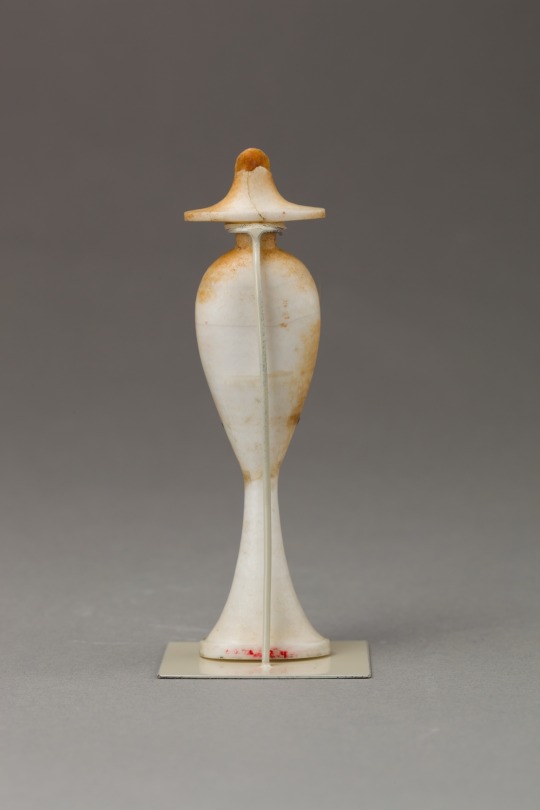


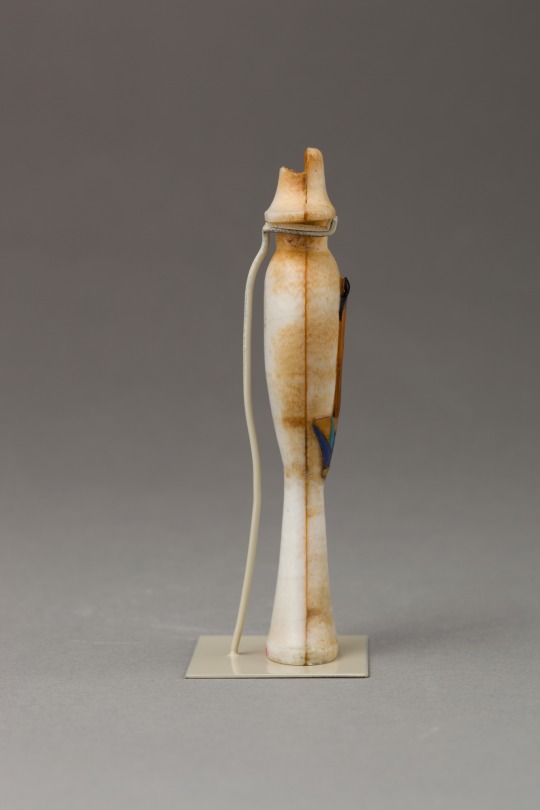
~ Perfume bottle in the shape of a hes-vase inlaid with the figure of a princess.
Period: New Kingdom, Amarna Period; 18th Dynasty; Reign of Akhenaten
Date: ca. 1353–1336 B.C.
Place of origin: Egypt; Possibly from Upper Egypt, Thebes
Medium: Travertine (Egyptian alabaster), carnelian, obsidian,gold, and colored glass inlay.
#ancient#ancient art#history#museum#archeology#ancient egypt#ancient history#archaeology#egyptology#egyptian#egypt#perfume bottle#hes-vase#princess#amarna period#18th dynasty#new kingdom#Akhenaten#thebes#ca. 1353 b.c.#ca. 1336 b.c.
791 notes
·
View notes
Photo

This map illustrates the Middle Kingdom of Egypt (c. 2055–1650 BCE), a period of political stability, economic revival, and cultural flourishing between the turbulence of the First and Second Intermediate Periods. Established by Mentuhotep II of the 11th Dynasty, it marked the reunification of Egypt and the rise of Thebes as a political and religious center. The 12th Dynasty, particularly under...
37 notes
·
View notes
Text

Tiresias, the famous blind prophet who became a LGBTQ+ icon as punishment for ruining snake sex one time!😂
🏺🏳️🌈🐍
#history#tiresias#epic the musical#the blind seer#ancient greece#lgbt history#mythology#the odyssey#thebes#apollo#ancient greek history#pride#lgbtq#hera#epic tiresias#myths#lgbt icons#ancient history#epic no longer you#non binary#gender#ancient greek mythology#nickys facts
38 notes
·
View notes
Text
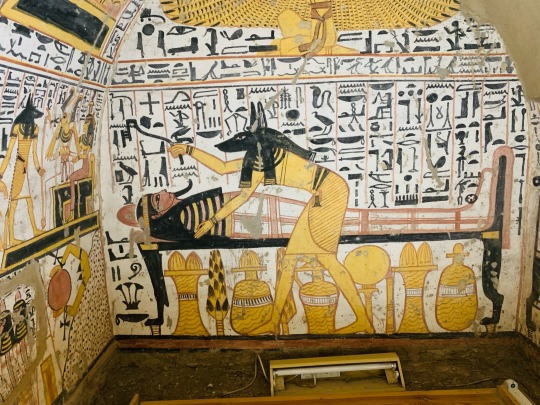
Anubis presiding over the process of mummification
258 notes
·
View notes
Text






Xena Warrior Princess The Dragon's Teeth #1 (December 1997) by Topps Comics
Written by Roy Thomas, drawn by Robert Teranishi and Steve Montano, cover by Zina Saunders.
#Xena Warrior Princess#The Dragon's Teeth#1997#Topps#Topps Comics#Xena#Warrior Princess#Etsy#Vintage Comics#Comic Books#Comics#Zina Saunders#Roy Thomas#Robert Teranishi#Steve Montano#Gabrielle#Thebes#Oedipus#Prince Adrastus#Adaptation#TV Show#Fantasy
18 notes
·
View notes